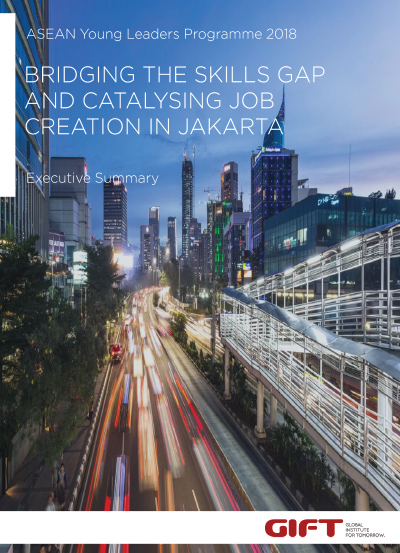Secure employment remains one of the strongest pathways out of poverty, yet communities on Jakarta’s urban and rural peripheries continue to face systemic barriers to quality jobs. Despite Indonesia’s economic diversification, nearly 10% of Jakartans were still living in poverty in 2018, and more than half the workforce was underqualified for available positions. The challenge runs deep, with 90% of informal workers possessing only primary-level education, creating severe skill shortages that perpetuate cycles of poverty.
The Jakarta Municipal Government has established 700 vocational training centers and supports micro-enterprises, but these efforts have not resolved the fundamental mismatch between workforce capabilities and economic needs. The result is an alarming paradox, a robust economic growth alongside stagnating social mobility, leaving millions trapped in informal work without stability or prospects.
In response, GIFT and the Jakarta Municipal Government have developed a groundbreaking model, a network of state-of-the-art Skills Hubs designed to break these cycles. The hubs represent a holistic approach that combines three key elements.
First, comprehensive vocational training. Each hub will deliver up to 25 tailored courses, ranging from welding to IT services, with curricula adapted to local employment opportunities. Trainees will acquire skills directly relevant to their communities’ needs.
Second, a public-private ecosystem. By leveraging partnerships between government and industry leaders, the hubs create pipelines from training to employment. Private sector involvement ensures training is aligned with real market demands.
Third, community transformation. Beyond training, the hubs will serve as vibrant community spaces with libraries, sports facilities, and food courts. Initiatives such as masterclasses and lunch-and-learn sessions will foster a culture of continuous learning and engagement across neighborhoods.
By tackling immediate skills gaps while addressing systemic barriers to employment, Jakarta’s Skills Hub initiative offers a comprehensive solution to one of urban development’s most persistent challenges. It reimagines the vocational training model as an engine of both economic and social mobility, one that prepares workers for jobs while transforming communities into active participants in Indonesia’s economic future.
The program’s true innovation lies in its recognition that sustainable poverty reduction requires more than training. It demands the simultaneous development of skills, creation of opportunity pathways, and strengthening of community foundations. If successful, this initiative could redefine workforce development strategies across the developing world.


